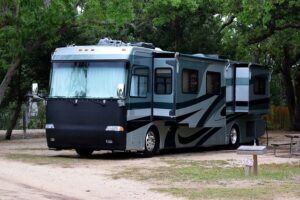
RV fires are not an uncommon occurrence, so prevention and preparation are essential.
Recreational vehicles, otherwise known as RVs, are required by the National Fire Protection Association (NFPA) to be equipped with at least one safe fire extinguisher. Although most RVs are equipped with more than one, usually mounted at the entrance to sleeping areas, in the kitchen, and one accessible from the exterior. Every extinguisher must be installed in accordance with NFPA requirements and located within 24 inches of the main exit or means of escape. Portable fire extinguishers can help save peoples lives. RV fires are not an uncommon occurrence, so prevention and preparation are essential. Read on to learn so much more about fire extinguishers on recreational vehicles.
How Common are Recreational Vehicle Fires?
The top causes of RV fires are unintentional failures of heat sources and equipment. The principal areas of origin in RV fires were found to be within the engine, transmission, and wheel/brake areas. Other origins include cooking areas and passenger compartment. Since there can be so many different sources of a fire on an RV, NFPA requires that all recreational vehicles must have a B:C rated fire extinguisher. Portable fire extinguishers are rated by classes, and these classes tell you the type of fires that the unit can extinguish. Class A includes normal combustibles like paper, wood, plastics, and trash. Class B extinguishers are to be used on flammable liquids or gases; Class C is used for fires that involve electrical equipment; Classes D and K are used for metals and cooking fires, respectively. NFPA requires Class B:C extinguishers on RVs because of the possibility of engine fires gas spills, or propane leaks. Keep this in mind while you’re looking for fire extinguishers.
When Should I Replace my RV’s Portable Fire Extinguisher?
Professional fire inspections are not required for portable fire extinguishers in recreational vehicles if they are intended for home use only, but you should still visually inspect these units on a regular basis. Look for signs of damage and check the gauge to see if it is still set to green. If your extinguisher has been used for any reason, replace it right away. You can purchase commercial grade fire extinguishers for use on an RV and this is a good idea. Most fire protection companies have a variety of portable fire extinguishers but remember these commercial-grade units require annual inspections by licensed firms. Make sure your portable extinguishers are not only in the right location but always in working condition.
Safety Tips for Your RV
- Make sure you have three working fire extinguishers in your RV. Everybody traveling in your group should know how to use one and which one to use for a particular fire.
- Clean up any fuel spills right away. Gasoline is extremely flammable and propane leaks are serious. While diesel is less dangerous, it is still hazardous.
- Look for any oily rags in the RV. They should be disposed of in a very safe manner outside the vehicle.
- Practice safe habits when using the kitchen and cooking appliances.
Fire Protection Services from Fireline
Whether you need smoke detectors, fire extinguishers, or an automatic sprinkler system installed at your commercial property, Fireline has you covered. We have been protecting people and property from fire damage since 1947—and our experience shows in our excellent work! We are known for our superb customer service, our expertise, and our reliability. For more information on how we can help your residential or commercial property, visit us online or give us a call at (800) 553-3405. We are located in Baltimore, MD, with a second office in Leesburg, VA. For more fire safety tips, be sure to follow us on Facebook, Twitter, and LinkedIn.
